Session One - Approaching the Old Testament: Adam to the Patriarchs
Introduction
What do you think when the Old Testament is mentioned? The Bible is not just one book, but an entire library, with stories, songs, poetry, letters and history, as well as literature that might more obviously qualify as 'religious'. As Christians we believe in the OT and NT.
The Christian Bible has two sections, the Old Testament (= covenant or agreement), with 39 books (taking up ¾ of the Bible), and the New Testament, with 27 books. The Old Testament is the original Hebrew Bible, the sacred scriptures of the Jewish faith, written at different times between about 1200 and 165 BC. That's a lot to cover in 8 weeks.
God has spoken to mankind through the Old Testament, revealing Himself through His dealings with the Patriarchs and the nation of Israel. Our purpose in doing a snapshot of the Old Testament is to understand a bit more about God and His redemptive work. The record was transmitted a very long time ago in languages and cultures different to our own, but that should not stop us reading the Old Testament and discovering what applies to our lives.
The oldest known Old Testament manuscripts still in existence are the Dead Sea Scrolls, discovered in 1947.
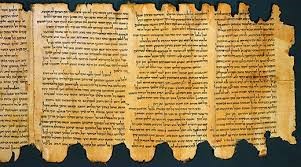
Dead Sea Scroll
The Importance of Revelation
Revelation = apokalypsis = uncovering what was previously hidden. (The opposite is "occult", which means "hidden".) Most in the OT did not understand the big picture.
Reasons for God's Revelation
- God is creator and sustainer of everything; He reveals Himself to His creation
- God made man in His image, with the need/capacity to have fellowship with Him; He revealed Himself to fulfil and contextualise that relationship
- man separated himself from God, who now has to take the initiative
- sin brings spiritual darkness; compounded by the deceptions of sin and Satan
Paul reminds us that God is not far from any one of us (Acts 17:27).
The Extent of God's Revelation
In revelation:
- God discloses Himself to our minds and understanding
- He communicates divine truth
- by single act/s (eg events, prophecies) and over a period of time
- discloses facts and concepts that could not be grasped in any other way.
God did reveal Himself to man, but rebellion led to sin (Romans 3:23). It is impossible for man by himself to find God (Titus 1:15).
General Revelation
God has not left Himself without witnesses in the world:
- nature (creation: Psalms 8 and 19, Romans 1; natural laws: Acts 14:17)
- history (Acts 17:26, 27); God dealt with nations: Egypt, Assyria, Babylon, Medo-Persia, Greece, Israel
- human conscience (Romans 2 - can be re-adapted to lower standards we accept; can be perverted by sin; nevertheless, confirms that there are a Lawgiver and Law).
Why general revelation?
- so that we would seek/find Him (Acts 17:27, 30)
- to provide a basis on which God could judge people; there is none without excuse.
Issues of insufficiency. General revelation:
- provides a motive for searching for God, but does not convict
- partial revelation is inconclusive; man turns into worship of the creature or substitutes with vague but unhelpful generalisations/concepts/principles
- does not lead to salvation
People search for God
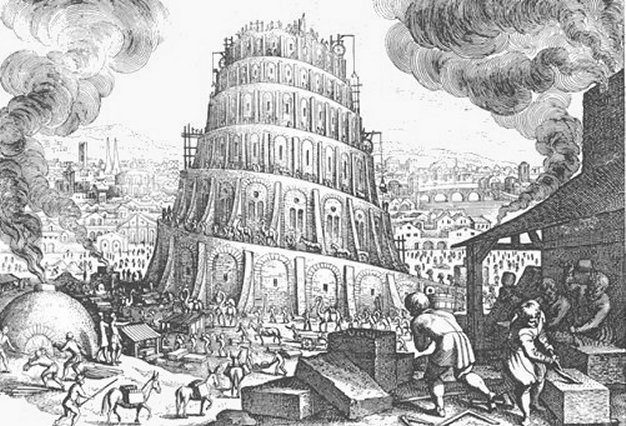
Artist's Impression, Tower of Babel
Special Revelation
God has progressively revealed Himself
- through prophets (eg 2,000 times in the Old Testament, cf 2 Peter 1:20-21)
- through miracles (eg Exodus 2-5; 1 Kings 18:22-39)
- through fulfilled prophecies (scores were fulfilled in the coming of Jesus Christ)
- through His Son (Hebrews 1:1-3; Colossians 1:15; John 1:18; 14:9)
The Bible as God's Revelation
Byblos = books (many religions have oral traditions; oral is limited, changes over time). The Bible is not primarily a book about:
- history
- geography
- philosophy (cf Bill Hayden "a book like Shakespeare)
- Israel
but about God. It was supernaturally given in order to:
- reveal God, His person and ways
- reveal God's will
- bring worship to Him
- reveal the way of salvation through Jesus Christ
The writing of the Bible
God's revelation did not start with the English language or Western culture. In the earliest (preliterate, or subsequent semi-literate) days, its transmission relied on oral tradition, an art form in which stories were handed down by poets and storytellers.
We place a premium on the written word, but it was not always so. The Old Testament was written down over a period of about 1000 years, from 1400-400 BC. It was understood by different generations in different ways (imagine reading something written in the year 1019 AD.) God used different people, contexts and styles, places, times and cultures, but the readers had confidence that it was His revelation:
"Long ago God spoke many times and in many ways to our ancestors through the prophets" (Hebrews 11:1).
".... you have known the holy Scriptures, which are able to make you wise for salvation through faith in Christ Jesus. All Scripture is God-breathed (theopneustos) and is useful for teaching, rebuking, correcting and training in righteousness, so that the man of God may be thoroughly equipped for every good work." (2 Timothy 3:15-17)
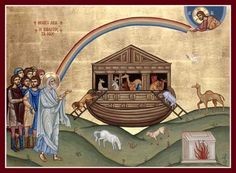
Artist's Impression, Noah's Ark
The Holy Spirit led to God's word being revealed and recorded.
Old Testament - Deuteronomy 4:2; Jeremiah 1:9
New Testament - 1 Corinthians 2:13; 1 Peter 1:1, 2; 1 Thessalonians 2:13
Theories of Inspiration
Natural - super-insight about God, moral and religious truth. Not supernatural. "Inspired" like human masterpieces. This theory places low value on Scripture and its authority. Susceptible to human weakness.
Plenary - God inspired the writers; they wrote what they received. Did not by-pass human intellect (vocabulary, style, culture, language).
Partial - Inspired in some places. The principles are inspired, but there are errors, eg geography, history, making it untrustworthy, ie who judges? who is truly objective? We are left with little confidence in the book.
Mechanical Dictation - Writers were merely secretaries for God, who recorded His dictation, eg "This is what the Lord says" (Exodus 34:27). Infers that God by-passed their human intellect. One issue that arises is the inclusion of material that does not comes from God, eg words by Satan, practices such as bigamy in the OT. Vocabulary and style vary widely.
Implications of Plenary Inspiration
- affirms divine authorship
- language is as if God Himself were speaking (Hebrews 3:7)
- infallible - incapable of deceiving or making a mistake; perfect and trustworthy (Psalm 19:7); the Bible's words are truthful and worthy of confidence
- inerrant = free from error
- sufficient - enough light to save sinners and guide the church; no need for external revelation; all we need to know, to lead us to Christ (2 Timothy 3:15; Luke 24:25-27).
- complete - it is the Word of God; it does not just "contain the word of God" (some books were never accepted by Jewish scholars; they make up the Apocrypha
- authoritative - stamped with God's supreme authority (Isaiah 1:2); not the word of men; claim to our obedience; need to understand it (context, culture, grammar, application).
Nothing profound in God's eternal truth comes to us without revelation. Only the Holy Spirit can illuminate our hearts (1 Corinthians 2:11) and impart understanding (cf Matthew 16:17). This is necessary because of spiritual darkness that exists outside of Christ (Romans 1:21; Ephesians 4:18; 5:8; Acts 26:18; Romans 2:19; John 1:5; Colossians 1;13). Without God's help we cannot understand spiritual things. This, in turn, releases faith (Romans 10:17). The Holy Spirit is our teacher (2 Corinthians 2:9-13; John 16:13; 1 John 2:27). We all have assumptions and we all tend to be selective about what we hear, so we need to learn to let the Bible speak for itself.
"In the beginning God created the heavens and the earth (Genesis 1:1)
Key issues:
- The universe is finite, but God is infinite, above all (Ephesians 4:6)
- The universe had a beginning, but God is eternal.
- He calls all things into existence, from non-existence (ex nihilo). Genesis 1, 2; Psalm 90:2; 102:25; Isaiah 40:26; Jeremiah 10:12; Amos 4:13; Matthew 19:4; John 1:3; Romans 1:25; 1 Corinthians 11:9; Colossians 1:16; Revelation 4:11; 10:6
- There was no compelling force for God to create. He did it according to His will and purpose - Acts 17:24; Colossians 1:16; Revelation 4:11; 10:6
- for His pleasure - Revelation 4:11
- to reflect His perfection and goodness - Genesis 1
- to declare His righteousness - Psalm 50; 97
- to reflect His glory - Psalm 8; 19:1; Ephesians 1 (Romans 1 shows us how man has refocused on the actual works of creation, rather than the Creator)
- The creation of man and woman was a special creative act. God made Adam the overseer of all things.
- The Bible does not attempt to "prove" creation. It is not a book about science.
There are debates about whether, how and over what period of time God created. The teaching of the Bible is that He was/is the creator, the source of all life.
There is a separation between God and creation, however the Bible teaches that the creation is good, unlike dualism which teaches that God is good and the material universe is evil.
God's hand is continually at work in the human story. He sustains the creation He made. The New Testament shows us that he did/does this through Jesus Christ
Why study the Old Testament?
The Old Testament can prompt debates about evolution. It is full of obscure laws that most of us don't follow, difficult-to-pronounce names, and hard-to-understand poetry.
And what do we even begin to make of the portrayal of God in the OT? In The God Delusion, evolutionary biologist and author Richard Dawkins writes:
The God of the Old Testament is arguably the most unpleasant character in all fiction: jealous and proud of it; a petty, unjust, unforgiving control-freak; a vindictive, bloodthirsty ethnic cleanser; a misogynistic, homophobic, racist, infanticidal, genocidal, filicidal, pestilential, megalomaniacal, sadomasochistic, capriciously malevolent bully.
Is the OT really worth the effort it takes to read it?
Shouldn't our focus be on the New Testament rather than the Hebrew Bible?
1. The Bible is incomplete without the Old Testament.
"The new is in the old concealed; the old is in the new revealed." This famous statement by Augustine (354-430) expresses the remarkable way in which the two testaments of the Bible are interrelated. The key to understanding the New Testament is to see in it the fulfilment of those things that were revealed in the background of the Old Testament. The Old Testament points forward in time, preparing God's people for the work of Christ.
The history of redemption began with creation itself. The book of Genesis, the first book of the Pentateuch (= the Jewish Torah), starts with the beginning, or the "genesis," of the universe as expressed in the revelation of God's mighty work of creation. The creation of the universe culminated in the narrative of the creation of humanity. This was followed very shortly by humanity's cataclysmic plunge into ruin as a result of the sin of Adam and Eve. From the third chapter of Genesis through the end of the Bible, the rest of the narrative history is the history of God's work of redeeming a fallen humanity. Genesis shows that the same God who is the God of creation is also the God of our redemption.
Genesis gives us an overview of the patriarchal period and the covenants (or agreements) that God made with them. They form the foundation for everything that follows in redemptive history. Beginning with Noah and moving toward Abraham, Isaac, Jacob, and the sons of Jacob, the story unfolds God's consistent pattern of redemption, which looks ahead for centuries, as God's people awaited the ultimate fulfilment of the patriarchal promises. These promises were fulfilled in the person and work of Jesus.
Christians believe that both the Old and New Testaments make up the Word of God. The New Testament was never given to replace the Old Testament but rather to complete its story. Genesis 3:14-19 records how a curse came upon humanity because of sin. Revelation 22:3 completes the story by recording how God, through the redemptive work of Jesus, has removed the curse. The theme of God's redemptive work would be incomplete without both Testaments revealing the beginning and end of the story.
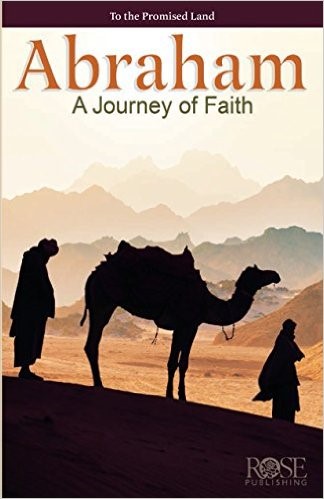
Abraham's faith is a lesson for all Christians
2. The Old Testament presents great truths about God and humanity.
In the first five books of the Bible, God reaches out to humanity and introduces Himself. God introduces Himself as the Creator (Gen 1-2), the Savior of His people (Ex 13-14), the Holy One (Lev 19:2), the God of wrath and judgment on sin (Num 14), and a God of love (Deut 7). It is in the Hebrew Bible that God reveals His attributes to Moses (Ex 34:6-7). We would not know God as well as we do apart from the revelation of the Old Testament.
3. The Old Testament lays the foundation for biblical prophecy.
It is in the Hebrew Bible that we find the revelation about God's covenant promises. In the Abrahamic Covenant God promises a land, a nation, and blessing that will extend from Israel to all the nations of the earth (Gen. 12:2-3). In the Davidic Covenant God promises that David will have a descendant who will sit on his throne and rule and reign forever (2 Sam. 7:12-16). The prophets Jeremiah and Ezekiel reveal how the blessing promised to Abraham and his descendants will be further developed and ultimately realized through the person and work of Jesus (Jer. 31:31-34, Ezek. 36:25-28).
4. The Old Testament provides the historical setting out of which Christianity and the New Testament emerged.
Christianity didn't emerge from a vacuum. God was moving among the people of Israel to bring forth the Messiah who would provide redemption from the judgment that came on humanity because of sin. The early New Testament preachers like Stephen (Acts 7) and Paul (Acts 13:16-41) made frequent use of the Hebrew Bible to declare God's plan for salvation. The story line of God's work in salvation begins in the Hebrew Bible and then continues its flow through the New Testament. We need to learn what we can about the audience for whom the books were written, and their circumstances. Ask yourself: what can I learn from what the text is teaching?
5. The Old Testament instructs believers concerning the person and work of Jesus, the promised Messiah.
We often forget that Jesus was thoroughly Jewish. He was immersed in the world of the Hebrew Scriptures. In fact, it's hard to overstate how much the OT shaped his life and mission. If we want to become like Jesus, we can't get around the OT.
Jesus' daily habits, historical context and message to those who understood Judaism, were all Jewish. He called Himself Son of David. He was born "under the Law", and submitted to it. He learned the Scriptures from childhood. He held His own when in the presence of the teachers of the Law. He used OT Scriptures to defeat Satan during his first recorded temptations. He quoted from it in his messages, eg the Sermon on the Mount and to his detractors, who agreed with his interpretation of the essence of the law. He referred to events in the OT, eg Adam, Abraham, Moses, David, Solomon, the Queen of Sheba, Jonah, Isaiah. The Last Supper was based on Jewish tradition. He was the "Lamb of God". His birth, His death, His resurrection, His return and His kingdom are all revealed in the Hebrew Bible (Luke 24:44-46). If you want to get to know Jesus, the "Lamb of God", you cannot neglect the prophecies found in the Old Testament.
6. The Old Testament presents spiritual truths and lessons that are applicable for Christians.
Paul illustrates this in 1 Corinthians 10:6-10, where he recounts for the church at Corinth a number of incidents that took place during Israel's wilderness wanderings. Then he writes, "Now these things happened to them as an example, and they were written for our instruction, upon whom the ends of the ages have come." Paul clearly intended for the Corinthians to learn from the lessons taught in the Hebrew Bible (see also Rom. 15:4).
7. The Old Testament is "God-breathed and profitable."
Paul declares that "all Scripture is "God-breathed and profitable for teaching, reproof, correction and training in righteousness" (2 Tim. 3:16). When he wrote these words he was referring to the Hebrew Bible. (There was no New Testament at the time.) If Christians neglect the study of the Old Testament they won't be as proficient in Christian service as they would otherwise be through a working knowledge and practical application of the Hebrew Bible.
The Context of the Old Testament
Context is critical to a correct understanding of why, where, and to whom the Old Testament was originally written, what it meant to real people who lived in real places (in terms of their language, culture, social structures, education and worldviews), and why we ended up accepting the 39 books that form the New Testament in our Bibles.
We need to try to put ourselves in their ancient heads and see through their eyes as we read, interpret and apply the Old Testament to their understanding, and our understanding, of Christian teaching and living.
- What was it like for them?
What does it mean for us, living as we do at such a distance from the original events? The message has not changed, but the context has, over the ensuing period.
- We need to know how to read apply the Old Testament today.
Old Testament theology is the study of what God has revealed about Himself in those times. The system of Old Testament theology takes the various truths that it teaches us about God and presents them in an organized fashion.
God's revelation of Himself begins in Genesis 1:1: "In the beginning God created the heavens and the earth." The presupposition of God and His creative work is something that all believers accept by faith and is emphasized throughout Scripture from Genesis to Revelation.
Old Testament theology is a rich and rewarding study of what God revealed of Himself, His character, His attributes, etc. The Old Testament focuses primarily on God's relationship with the Jews, starting with His call of Abraham in Genesis 12. He chose Israel and covenanted with them for the purpose of relaying His message to the world and ultimately bringing the Messiah to save us from our sin. Through His relationship with the Jews, God blessed the entire world (Genesis 12:3).
The Old Testament chronicles God's progressive revelation of Himself, specifically to His chosen people but also to those of Gentile heritage, in order that we might learn who He is and His plan in the world. The idea of a covenant between God and man is woven into the Old Testament: the first agreement was made with Adam, and others with Noah, Abraham, the nation of Israel, and David.
The Old Testament reveals to us the greatness of God, the terrible consequences of sin and the blessings that come through obedience to Him. It is foundational to our understanding of God and His purposes in the world. The seeds of the doctrines of substitutionary atonement, salvation, election, holiness, mercy, judgment, and forgiveness are all found in the Old Testament.
Time Line

Another Way of Looking at the Time Line
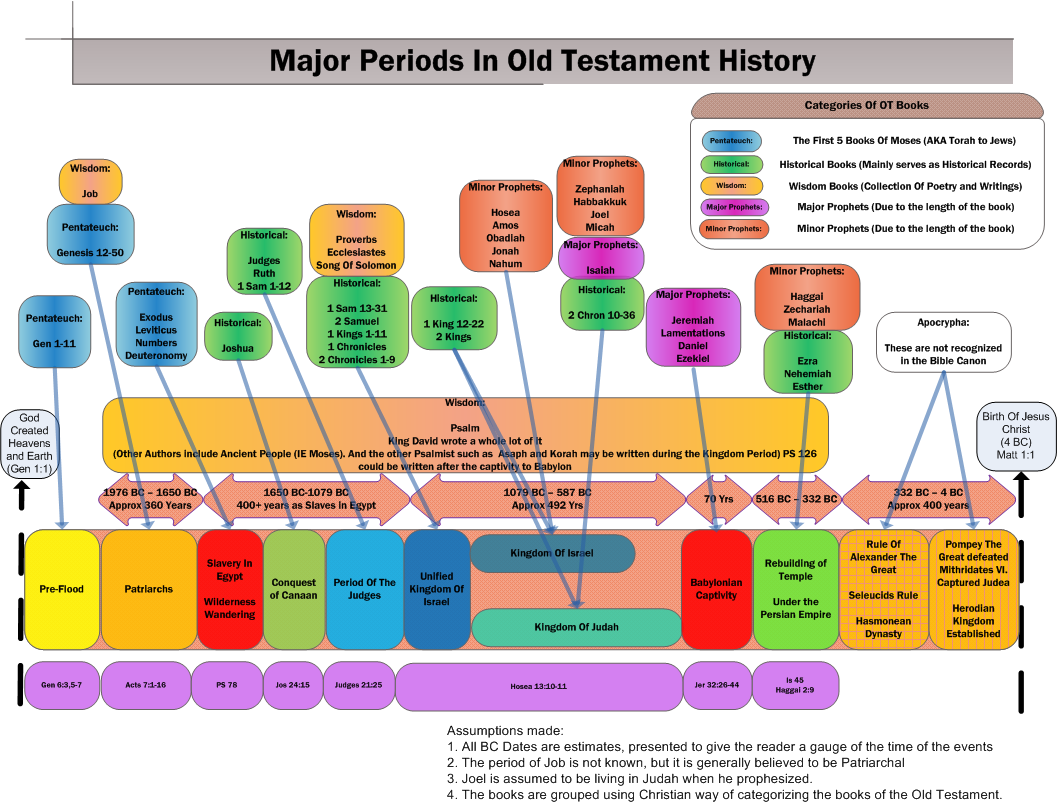
Overall Structure of the Old Testament
The Old Testament is a collection of books, not one long story. The order is our Bibles is not chronological either. These books can, however, be grouped for convenience.
The Law
The Hebrew Bible has 39 books, written over a long period of time, and is the literary archive of the ancient nation of Israel, though there are many gaps. It was traditionally arranged in three sections.
The first five books, Genesis to Deuteronomy, are not 'law' in a modern sense: Genesis is a book of stories, with nothing remotely like rules and regulations, and though the other four do contain community laws they also have many narratives. The Hebrew word for Law ('Torah') means 'guidance' or 'instruction', and that could include stories offering everyday examples of how people were meant to live as well as legal requirements.
These books were later called the 'Pentateuch' (lit. 5 books), and tradition attributed them to Moses. Some parts undoubtedly date from that period, but as things changed old laws were updated and new ones produced, and this was the work of later editors over several centuries. The books in the Pentateuch are:
Genesis - Genesis speaks of beginnings and is foundational to the understanding of the rest of the Bible. It is supremely a book that speaks about relationships, highlighting those between God and his creation, between God and humankind, and between human beings.
Exodus - Exodus describes the history of the exodus of the Israelites from Egypt after slavery. The book lays a foundational theology in which God reveals his name, his attributes, his redemption, his law and how he is to be worshiped.
Leviticus - Leviticus receives its name from the Septuagint (the pre-Christian Greek translation of the Old Testament) and means "concerning the Levites" (the priests of Israel). It serves as a manual of regulations enabling the holy King to set up his earthly throne among the people of his kingdom. It explains how they are to be his holy people and to worship him in a holy manner.
Numbers - Numbers relates the story of Israel's journey from Mount Sinai to the plains of Moab on the border of Canaan. It tells of the murmuring and rebellion of Israel and of their subsequent judgment. There are lots of numbers in this book.
Deuteronomy - Deuteronomy ("second giving of the Law", or nomos) serves as a reminder to God's people about His covenant. The book is a "pause" before Joshua's conquest begins and a reminder of what God required.
The Prophets
The Prophets is the largest section of the Hebrew Bible and has two parts ('former prophets' and 'latter prophets').
The 'former prophets' consist of Joshua, Judges, 1-2 Samuel, 1-2 Kings. They are history books, but what makes them also 'prophets' is that they not only record information, they interpret it, explaining its significance in relation to other events in the history of Israel, and of the wider world of their day. The ides of prophecy was much broader than predicting the future.
The books of 'latter prophets' preserve sayings and stories of religious and political activists ('prophets') who served as the spiritual conscience of the nation throughout its history, reminding people of the social values that would reflect the character of God. Some books are substantial (Isaiah, Jeremiah, Ezekiel), others are much shorter (Hosea, Joel, Amos, Obadiah, Jonah, Micah, Nahum, Habakkuk, Zephaniah, Haggai, Zechariah, Malachi). Sometimes, the prophets could be mime artists and dramatists, accompanying their actions by short spoken messages, often delivered in poetic form. These were the sound bites of their day, which made it easy for others to remember them and then write them down.
The Writings
These include Psalms (songs, prayers and liturgies for worship), Proverbs (sayings of wisdom), Job (a drama that explores the nature of suffering), plus the 'five scrolls' ('Megiloth') which were grouped together because each had associations with a particular religious festival: Ruth (the Jewish Feast of Weeks, also called Shavuot), Song of Solomon (Passover), Ecclesiastes (Tabernacles), Lamentations (Destruction of Jerusalem), and Esther (Purim). This section also includes the last books of the Hebrew Bible to be written: Ezra, Nehemiah, and 1-2 Chronicles (all history books), and Daniel (visions of a better world).
When did Creation Occur?
We do not know.
Bishop James Ussher (1581-1656; Church of Ireland Archbishop of Armagh and Primate of All Ireland between 1625-1656) added up the known genealogies of the Bible and estimated the world was created around 23 October 4004 BC (Annales veteris testamenti, a prima mundi origine deducti, or Annals of the Old Testament, deduced from the first origins of the world", 1650).
The Bible neither makes nor supports such claims. Some of the genealogies are incomplete or overlap. Also, we do not know how long Adam and Eve lived in Eden before they sinned. Remember, Genesis is not a complete history book (even though it catalogues real events). It does not draw chronologies together systematically.
The World of the Old Testament
The history of the Old Testament developed within a specific geographical context, the ancient Near East, known today as the Middle East. The world of the Old Testament is usually identified with the Fertile Crescent, which gave rise to the earliest civilisations of the region.
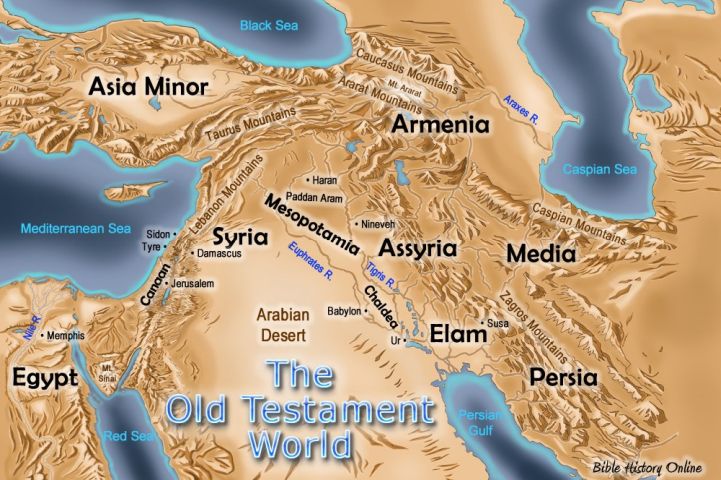
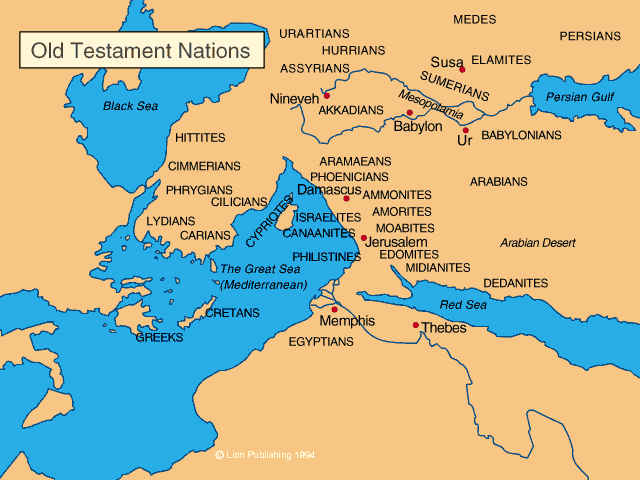
Some Characters in Genesis
- Adam - The first human, the father of our race, and, along with his wife Eve, the caretaker of the Garden of Eden. Adam falls from grace when Eve convinces him to join her in the sin of eating from the Tree of the Knowledge of Good & Evil.
- Cain - Son of Adam and Eve who killed his brother Abel out of jealousy.
- Abel - Second son of Adam and Eve, killed by Cain.
- Noah - the Hebrew patriarch who saved himself and his family and the animals by building an ark in which they survived 40 days and 40 nights of rain when God judged the world.
- Shem, Ham, Japheth - the three sons of Noah.
- Abraham - the first of the Old Testament patriarchs and the father of Isaac.
- Sarah - the wife of Abraham and mother of Isaac.
- Hagar - Sarah's Egyptian maid; given to Abraham as a concubine; received an angelic annunciation regarding the destiny of their son Ishmael; matriarch of the Arab people.
- Lot and his Wife - Lived in Sodom, housed angels whom visitors wanted to rape. Lot's wife turned into a pillar of salt.
- Melchizedek - King of Salem, also a priest.
- Ishmael the son of Abraham who was cast out after the birth of Isaac.
- Isaac - Abraham's son with Sarah who was almost sacrificed by his father; the second patriarch.
- Rebekah - wife of Isaac and mother of Jacob and Esau.
- Esau - son of Rebecca and Isaac. He is the first born, but his birthright is taken by his brother Jacob.
- Jacob - grandson of Abraham, son of Isaac & Rebekah, brother of Esau. His name was changed to Israel. His 12 sons became the 12 tribes of Israel.
- Leah - Wife of Jacob, mother of Judah and Levi.
- Rachel - the second wife of Jacob and mother of Joseph and Benjamin.
- Reuben - a son of Jacob. Saves Joseph's life by convincing the brothers to throw him in a well instead of killing him.
- Simeon - son of Jacob and Leah. He and Levi massacred the people of Shechem.
- Levi - Son of Leah and Jacob, brother of Judah.
- Judah - the fourth son of Jacob; his name means "praise".
- Dan, Naphtali, Gad, Asher, Issachar, Zebulun, Benjamin, Dinah - other children of Jacob.
- Joseph - the 11th son of Jacob and one of the 12 patriarchs of Israel, Jacob's favourite son, interpreted dreams.
- Manessah - Brother of Ephraim, son of Joseph and Asenath.
- Ephraim - Youngest son of Joseph and the daughter of an Egyptian high priest, Jacob blesses/adopts Ephraim and his brother Manasseh at his death, but switches hands and birth-order, places Ephraim above his brother.
- Potiphar - Master of Joseph before jailing him for the supposed rape of his wife.

Joseph, ruler of Egypt
For Reflection
As we work our way through the brief snapshot of the Old Testament, ask yourself three questions:
- What was the significance of this for the original recipients and users, before the coming of Jesus, in terms of their relationships with God?
- The original readers understood the OT as "their" Scriptures, but Christianity has adopted these books and understand them as part of a consistent revelation through to Jesus Christ, even as application is expanded from the first listeners to the entire Christian community, eg Psalm 96.
- Christians believe that the original recipients had the authentic traditions, writings and experiences, but did not understand all of the implications, because they were spiritually blind, OR rebellion/disobedience caused them to forfeit the promises, OR it was simply too early in the trajectory of divine revelation to mankind for all of the meanings to be grasped bat the time.
- What is the significance of this for us today, as a Christian community?
- What is the significance of this for me?
- The Old Testament is a collection of testimonies written by people about their relationship with God, their successes and mistakes. How would you record your testimony, for future generations to read?
Action
If you have a reading plan such as the One Year Bible you will finding passages from the Old Testament, plus Psalms and Proverbs, for each day of the year (this way you can cover the entire Old Testament in a single year and have time to think about what it is saying).
The Old Testament was the Bible that Jesus and the disciples and other early Christians used. Read Philip Yancey's book "The Bible Jesus Read" (1999).








